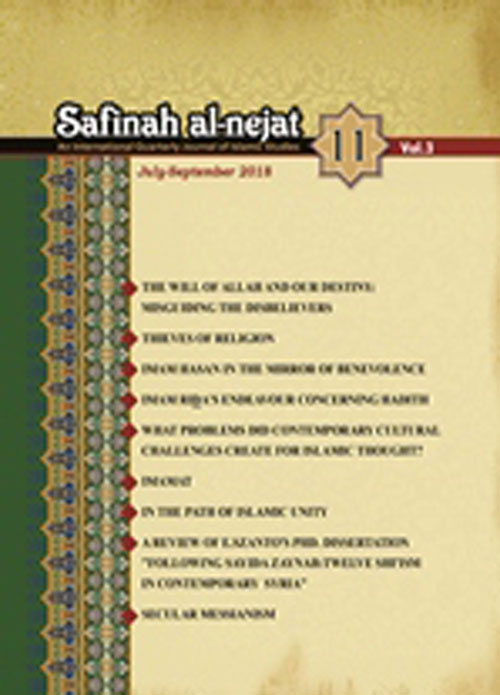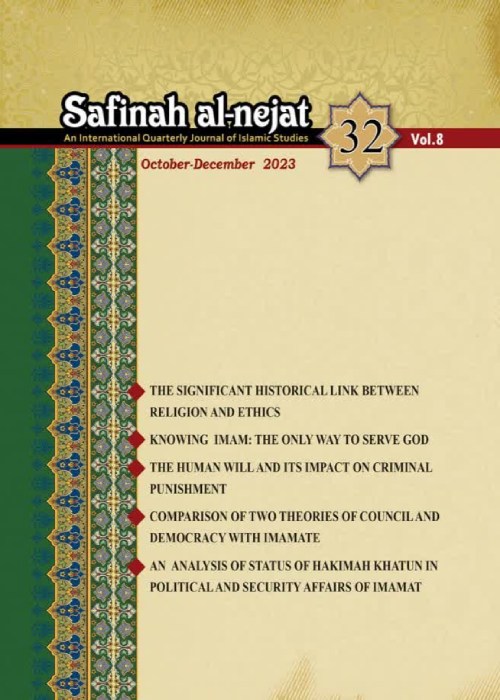فهرست مطالب

Safinah al-nejat
Volume:3 Issue: 11, Summer 2018
- تاریخ انتشار: 1398/02/15
- تعداد عناوین: 10
-
Pages 5-6These days are coincided with the anniversary of the revolution of ‘Ashura in Muslim countries, which is respected in the Western countries under the title of Imam Husayn’s Day.
‘Ashura and the behavior of Imam Husayn (p.b.u.h.) was a pattern of rescue of the oppressed Shia peoples and thirsty followers of justice throughout history, against the oppressor caliphs.
From the very beginning, as soon as the holy family of the martyred Imam (a.s.) were taken,as slaves, to the court of the wicked Yazid bin Mu‘awiyah (may God damn them); and the young Imam Sajjad (p.b.u.h.) and Her Excellency, Hadrat Zeinab, gave their enlightening speeches; all the audience, including the Yazid and his near family, condemned the brutal behavior of the aggressive army of the caliph, and the governor and the militia of Kufa town against the Innocent Imam and his fellows. The same has been repeated during the last 14 centuries, by all the free and aware noble people.
At this crucial and sorrowful time, we, as the followers of the Shia doctrine and school of thoughts, and the friends of Imam Husayn and Ahl- Bayt of the holy Prophet (p.b.u.h & h.f.) express our solidarity with him and our disgust at his enemies, now and forever.
Some brilliant aspects of the characteristics of the holy Imam Husayn, that may be taken as a good pattern for the humankind, in the long history, can be summed up, as below:- Neglecting Injustice
- Valor
- Firm Determination
- Firmness in the path of God and Truth
- Frankness
- Humility, and bereft of Pride and Arrogance
- Patience and forbearance
I cordially take this opportunity to invite our respected readers to think and study about the movement of the Imam Husayn, and publish his name, thought, and behavior, in all the possible ways. -
Pages 7-31In this part, the religious meaning of misguidance attributed to Allah is discussed in details, and that why Allah misguides, and whom He misguides. It is also discussed if this action of Allah negates His justice, and whether those who are misguided by Allah have any excuse for their wrong actions. Moreover, the role of the Satan in this type of misguidance is explained.Keywords: Misguidance, gradual decline, will of Allah
-
Pages 32-42Nahj al-Balaghah is a book of teachings of Imam ‘Ali ibn Abi Talib which was compiled by Sharif Radi (400 A.H.). Since then, it has been a source to know true Islam, in the best possible way as he was the closest companion of the Prophet.
Dr. Mostafa Delshad, along with teaching at university, has more than 20 years of experience in researching about topics related to Nahj al-Balaghah. He has written around 30 books in this topic so far. The present article is dealing with religious pathology and religiosity in Nahj al-Balaghah.Keywords: religion, religiosity, Nahj al-Balaghah -
Pages 43-52We select some sayings of imam Hasan from “Tuhaf al-‘Uqul an Ale al-Rasul” by ibn Shube’ Harrani and explain them. These wisdom words are taken from one of the Shia resources (i.e. Tuhaf al-‘Uqul an Ale al-Rasul) which is of the most organized and beautiful works written during Shia history and is regarded of great research-based innovation.
-
Pages 53-59The life of Imam ‘Ali ibn Musa al- Rida - since his birth till his martyrdom – includes very valuable and informative points. The relatively long period of imamate of the Imam from one hand, and the formation of deviated groups and trends and also political events of the time from the other hand, has made his life attention-worthy. In the following, we are studying his attempts to record traditions.Keywords: Ahlul-Bayt, circles of Hadith
-
Pages 60-63Abdul Hadi Fazli (1314-1392 AH) was a Shiite cleric and influential figure in the 14th century in the Eastern region of Saudi Arabia. He had a comprehensive education in seminary and university science. Fazli has many publications in various fields of Islamic sciences.
In the following, a part of his answers to some questions about Islam and contemporary challenges in front of it are mentioned.Keywords: cultural challenges, Scientific achievements, Islam -
Pages 64-78The present article is dealing with the issues related to necessity of presence of Imams. After talking about this necessity, Imams are introduced and in the following issues related to obeying imams, Tawasul and Tamasuk, their knowledge about unseen, Willayah and rulership, kindness towards them and ziyarah have been mentioned.Keywords: Prophecy, Khatamiyat, successorship, Caliphate
-
Pages 79-83In the present article, the meaning of Sahabi and issues concerning it which is very important in Islam has been mentioned in the form of question and answer to help their understanding easier.
-
Pages 84-88The research under review is concerned with the concept of tradition as accepted and practiced at the shrine-town of Lady Zaynab in Syria through an ethnographical investigation. It analyzes of the ritual of mourning gathering by women at the shrine, the annual commemoration of Imam al-Ḥusayn in Muḥarram, and finally the spiritual healings and miracles associated with it. The study was, to some extent, based upon Talāl Asad's (1986) notion of ethnography of Islam and various iterations of Karbala emanating from Fischer’s (1981) framework of the Karbala paradigm. The present review, seeks to analyze the major issues raised by the author and propound a critical reading of the text.Keywords: Lady Zaynab, Syria, Shi’a, Muḥarram, Mourning gathering
-
Secular Messianism / AN INTERVIEW WITH SALIM BOSTRUSPages 89-92in the following, we are going to read an interview with H.E. Archbishop Cyril Salim Bustros, Archbishop of Beirut & Byblos about commonalities between religions. The questioned asked were more than what included here; We selected some questions related to Islam which were asked and mentioned them in this article. To explaine the topic of our interview, knowing the meaning of Messianism seems necessary. Messianism is the belief in the advent of a messiah who acts as the savior or liberator of a group of people. Religions with a messiah concept include Zoroastrianism (Saoshyant), Judaism (the Mashiach), Buddhism (Maitreya), Hinduism (Kalki), Taoism (Li Hong), and Bábism (He whom God shall make manifest).


